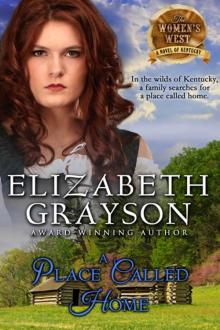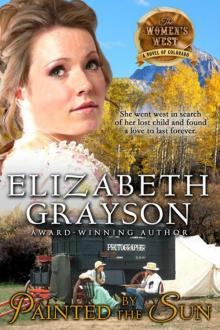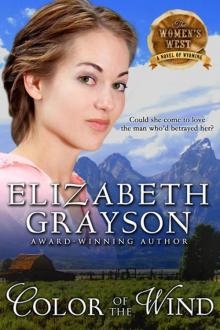- Home
- Elizabeth Grayson
Color of the Wind Page 3
Color of the Wind Read online
Page 3
"Well, old Dandy," he crooned, as he moved nearer. "Are you going to let me ride you this time?"
The bay rolled his eyes and shifted his feet.
Baird gathered up the reins and stroked the gelding's rough winter coat. "Does no one curry you, fellow?" The horse snorted. "Will you let me groom you later?"
As he waited, working his hand up the big bay's chest and toward his shoulders, Baird became aware of a hum in the air, a focused awareness from the men gathered along the fence. He could feel the heat of it against his back, a certain discomfort emanating from the assembled ranch hands.
He glanced over his shoulder as he reached to grip the saddle horn, but something in the cowboys' faces gave him pause. Baird turned and looked at them directly.
One ducked his head. Several turned their eyes away.
Baird looked toward Buck Johnson, seeking something in those deep, watchful eyes. Johnson studied him hard, and then gave the ghost of a smile.
Acting half on intuition, Baird slowly loosened Dandy's cinch and ran his hand along the shallow curve of the horse's back.
"Easy, boy," he whispered as the bay began to dance. "Easy, Dandy."
He probed deeper, beneath the saddle, not sure what he was looking for until he found it. Something pointed and sharp was wedged between the saddle blanket and Dandy's coat. He pulled the blanket free and worked a long, wicked-looking thorn out of the thick, woven fabric.
Baird stood there in stunned surprise. The thorn had been stuck in that blanket deliberately. His hands began to shake as he looked from the thorn to the gelding to the men along the fence.
This time the cowboys stared back without flinching, acknowledging what they'd done. These men had dared to test him. These—hirelings—had challenged his horsemanship, his skill, his very right to be here. They'd humiliated him in front of Cullen McKay. He ought to fire the lot of them, tell them to clear out their belongings and leave the ranch.
And what would that accomplish?
He sensed Johnson's eyes on him, sensed him waiting to see what Baird would do.
He looked down at the thorn again, all spiny and black—and then he laughed. Deep, rich peals of hilarity, that spiraled upward in the cold air. Booms of mirth that made Dandy shy and left Baird gasping.
Along the fence, the cowboys spat and slapped each other on the back, chuckling among themselves. They raised their eyebrows and shrugged as if to say this boss was an Englishman who might bear watching.
The men were grinning by the time Baird caught his breath enough to unsaddle Dandy. He went through the tack carefully, smoothing the blanket before settling the saddle over it, double-checking the girth to be sure it was tight. This time when Baird swung up onto the big bay, he settled back in the saddle like a granny into a rocking chair.
Johnson's mustache quirked at one corner, and he nudged his buttermilk toward the gate. "You 'bout ready for your tour now, Mr. Northcross?" he inquired.
Baird nodded. "Oh yes, Mr. Johnson, I believe I am."
* * *
"It certainly isn't England," Baird mumbled half to himself as he stared out across what seemed like an endless expanse of prairie land.
Beside him Buck Johnson shifted in his saddle. "Did you expect it to be?"
They had paused in their tour of the ranch at the base of a high stony ridge that ran off to the south. Baird shrugged, not sure what he'd expected—not England's manicured countryside, not its saturated shades of green and gold, not the scent of boxwood or the trill of meadowlarks.
But he hadn't anticipated anything like this, either. He scanned the miles of yellowed grassland to where it met the thick gray fleece of the winter sky. He sensed the mountains hunched in ridges at his back, felt the raw wind and the solitude.
This place was different from anywhere he'd ever been—the steamy jungles of Burma, the towering peaks of the Khyber Pass, the teaming African savannah. This land, this Wyoming, was like a feral, half-grown child, one who would never tolerate a master. That spoke to something inside of Baird himself.
"How much of this belongs to the ranch?" he asked, glad that the sudden tightness in his throat hadn't tainted his voice.
Johnson shook his head. "All of it," he said. "None of it."
Baird turned to look at him. With his hat pulled low and his sheepskin collar turned up around his ears, Johnson's cheeks shone red in his weathered face.
"What do you mean?"
The older man's mouth narrowed, drawing his mustache down over his lower lip. "Didn't anyone tell you how this works?"
Baird remembered the portfolio of papers his uncle had had delivered to his father-in-law's house the day before he left London. He hadn't so much as glanced at them, not once on the voyage, not once on the train.
"No," he answered.
Johnson drew breath as if he were reluctant to explain to someone who didn't give a damn about the ranch and who would leave at the end of the summer—if not before. But Baird continued to stare, not giving him any choice.
"This ranch," Johnson began, "and most of the cattle ranches from here to Mexico, count on something called free range. That means that the cattle graze on the land that no one claims, land that belongs to the United States government."
"You mean the Greater British Cattle Company doesn't own any of this?" he asked incredulously.
"The company bought range rights when they invested in the herd, so they'd be sure to have access to water."
"Down along Sugar Creek, you mean?" When Johnson nodded, Baird went on. "And the rest of this is good grazing land?"
It seemed hard to believe, as trampled and yellowed and weather-beaten as the landscape looked.
Johnson's eyes began to shine. "It's the best the Lord could provide. Come spring that bay of yours will be chest deep in grama grass, as green and sweet as honey. The beeves thrive on it, and as it dries, it blows in the wind like waves of gold. For cattlemen, it's every bit as precious."
Baird nodded in acknowledgment. If what Johnson said was true, whoever came up with this investment was a genius. "So we buy cows cheap, fatten them on this free grass, and sell them for a profit."
"That's the way it's supposed to work," Johnson allowed. "'Course, it's not always quite as simple as that."
Baird turned a deaf ear to the older man's qualification. This wasn't an investor's gamble. It was a sure thing. Maybe he should unearth that portfolio from his baggage and see if he could figure out just how successful the enterprise had been these past three years. It must be foolproof, he thought, for his uncle to entrust the ranch to him. Something even he couldn't mismanage. He felt both suddenly better, and infinitely worse, about his exile to the wilds of America.
Baird shortened up his gelding's reins. "I'd like to see the rest of it."
Johnson led him higher up the ridge and into the foothills of what he told Baird were the Big Horn Mountains. With each loop of the trail, the view became more spectacular, a rolling carpet of land stretched to where the horizon blurred with the haze of approaching dark. Baird tried to fill his eyes with it and failed, tried to understand his place in the scope of such country as this and failed a second time.
"'Bout time we started back," Johnson finally suggested. "Myra'll have supper ready."
Baird was cold, and the idea of a meal, a warm fire, and a tumbler of whiskey appealed to him. Still, he was reluctant to leave this strange new place that had begun to work its wiles on him.
Buck Johnson led the way down the ridge, circling to the north and taking a different trail, one that shadowed the creek's meandering course. They had been riding for some time through a cluster of pines and the deepening dusk when Johnson pulled up short. He signaled Baird to stop and slid the rifle from his saddle holster.
Baird instinctively reached for the Winchester that hung to the right of his own saddle and peered ahead. There were half a dozen deer grazing in the meadow at the far side of the creek, standing motionless and nearly invisible against the brindle-brown
grass.
"We'll just get one of these to take home to Myra," Johnson said under his breath as he raised his rifle. He carefully sighted down the barrel and fired. The boom reverberated from the sides of the creek bed, and the deer scattered, springing away swift and graceful.
All the deer ran.
Johnson swore softly. He'd missed his shot.
In a single motion, Baird knocked the rifle to his shoulder, and barely taking time to aim, pulled the trigger. He caught one of the deer in mid-flight. The animal stiffened, lost its grace, and dropped like a stone. It lay twisted and broken halfway up the slope on the far side of the stream.
Baird lowered the rifle from his shoulder and realized his hands were shaking. His chest was squeezed tight, and he sucked in one long breath and then another. He was dizzy, feverish and sweating as if it were high summer instead of twenty degrees.
Johnson swiveled around in his saddle and stared at him in surprise. If he noticed any of what Baird was feeling, he gave no sign of it. "Nice shot, Mr. Northcross," he said. "You're quite a marksman."
Baird stifled the urge to mop his brow on the sleeve of his riding jacket. "Yes," was all he said.
Chapter 2
Ardith's troubles with the children began their very first night on the train. She was just snuggling down into her Pullman berth when Khy peered at her from the bed above. Even in the dim light that filtered through the privacy curtains, Ardith could see that he'd been crying.
"What's the matter?" she murmured, mindful of the other sleepers only a curtain away.
"I—I..." His lip began to quiver.
"What is it, Khy?"
He climbed down into her narrow berth. "I wet the bed," he whispered back.
She stared at him, appalled. Did boys his age still do that? "Why—why on earth didn't you get up and use the gentlemen's privy?"
Two big tears rolled down Khy's cheeks. "I—I don't know. I didn't mean to do it."
Ardith heaved a sigh. "Of course you didn't." She reached for her wrapper and pulled it on. "I guess I should go ask the porter for fresh sheets and see—"
Khy's eyes went wide in a face still faintly smudged with coal dust. "Oh, no, Aunt Ardith! You mustn't tell anyone!"
The way he ducked his head and the quaver in his voice made something shift in Ardith's chest. Instead of acknowledging it, she pursed her lips and clambered past the boy into the aisle.
A tall Negro porter swayed toward her. "Is there something you need, ma'am?"
Feeling her own face heat with embarrassment, Ardith explained the problem.
"That happens sometimes," the man soothed her. "Traveling upsets children's systems. Sometimes they don't wake up when they should. Sometimes they're too shy to climb out of their beds to do what they need to do."
Ardith swallowed hard. This porter—this stranger—was showing her nephew more concern and understanding than she had been able to muster on his behalf.
"I—I thank you for your kindness," she murmured.
After Ardith had located a clean pair of drawers for Khy and helped the porter strip the upper bed, she ducked back inside the curtains. Khy was wedged into the farthest corner of her berth, curled in upon himself as if he wanted to disappear.
"Are you better now?" she asked him.
He sniffed and nodded.
Ardith eased onto the bed and wondered what to do with him. The mattress on the upper berth was soaked, and the porter said there were no unoccupied berths anywhere on the train.
"Well, Khy, I—I think you should sleep with me tonight," she began, trying to sound more matter-of-fact about the arrangement than she felt.
"You do?" His eyes went round again.
"I think you were lonely up there by yourself," she went on, seizing on the first thing that came into her head. "I—I think in a strange place it helps to have someone close at hand."
He ducked his head, his shoulders hunching. "You won't tell Durban, will you?" She could hear the tears in his voice. "He'd call me baby for—you know."
The weight inside her shifted again, and Ardith didn't have the faintest idea how to make things better.
Oh, dear, but I'll be glad to get these children to Wyoming! she thought before she mustered a smile to reassure him.
"I won't tell Durban anything. But I do want you to lie down here beside me, but on the aisle, so that if you need to get up, you can. And I want you to wake me so I can walk you to the privy. Is that all right?"
"Yes." It was a small word, spoken with grave uncertainty.
Ardith helped him climb past her to the outer side of the swaying berth and then put her own back to the wall of windows. Khy settled down on his side facing away and lying there stiff as a stick, as if he wasn't sure she could give him the comfort he needed.
Ardith wasn't sure either, but she had to try. "It's all right," she murmured and tentatively put her palm against his back. When he didn't flinch away, she curled it around his shoulder.
In all her life Ardith had never slept with anyone, not even as a child. It made her profoundly aware of Khy's heat radiating against her chest and thighs. His soft, ruffled breathing seemed loud in the silence. She wasn't sure she even liked having someone so close, yet she let him nestle nearer.
His tousled hair brushed her throat. His faintly musty little-boy scent filled her nostrils. She shifted her palm to the center of his chest, inscribing a warm, protective arc with the curve of her arm.
Just when Ardith was beginning to think Khy had fallen asleep, he turned to her. "Aunt Ardith?"
"Yes?"
"Why did our mama go away from us?"
The catch in Khy's voice tore at her. She'd expected the children to ask her that a few weeks back, and she'd practiced some proper Christian platitudes she hoped would satisfy them. She'd been heartily relieved when none of them had wanted her to explain their mother's death.
Now, lying with Khy's vulnerable flesh pressed close against her own, Ardith knew she couldn't ease his misery with those cold, dead words.
"Oh, Khy," she murmured, hugging him tight. "I don't know why your mama went away. I know she loved you and China and Durban very much. I know she wanted to stay with you, and that she cried when she asked me to take you to your father."
Ardith remembered the feverish glitter in Ariel's eyes as she'd demanded that promise, and Ardith was ashamed that the words that would release her sister and give her peace had stuck to her own lips like bits of cotton wool.
She heard Khy sniffle and pressed her cheek into his hair. "Don't doubt for a moment how much your mama loved you," she whispered. "She would have stayed with you in this life if she could."
Ardith lay barely breathing, waiting for some sign that what she'd said had helped. Finally, Khy nodded and sighed. Gradually the tension seeped out of his warm little body as he drifted to sleep.
* * *
The children asked Ardith no more questions about their mother during the next two days, but there were a myriad of others. How did trains get across rivers before there were bridges? Why did apples have skins you could eat and oranges didn't? How do cows make milk? There would be plenty more today, Ardith surmised, because they were going to explore Chicago.
She originally had intended simply to change stations in Chicago and press directly on toward Omaha. But traveling with these three was like being corked up in a jug of fermenting cider, and they needed a day out of the swaying cars to expend that pent-up energy.
After securing a suite of rooms at the Palmer House, Ardith and the children explored the city, visiting the lakefront, going to museums and shops. When she finally collected their key from the desk clerk just before five o'clock, she had to admit the day had gone far better than she'd dared to expect.
But as she trailed the children across the lobby, that sense of well-being evaporated. Ardith began to notice how the women paused in their conversations to stare at China, that men looked up from their newspapers, their eyes alight. The girl shone like a comet se
aring its way across the sky. And suddenly Ardith felt like she had when she was a child—like a dull, dun-gray shadow trailing in her sister's glittering wake.
She came up behind the children where they were waiting for the elevator, just in time to hear a man addressing China. "Do you suppose, Miss Northcross, that I might meet you here in the lobby later? I'd like to hear more about this ranch your papa's managing."
The way the man was leering at her niece sent ripples of alarm along Ardith's nerves. "She most certainly may not meet you, sir!" Ardith spoke up before China could answer. "And it's completely inappropriate for you to be proposing such a meeting to any lady, much less a girl of my niece's tender years."
"Oh, Aunt Ardith!" China gasped, her cheeks flushing the color of cherries. "Please!"
"How old is she?" the man asked, turning a scowl on her.
"She's fifteen," Ardith answered and watched with a pinch of satisfaction as the man hastily backed away.
"Be assured ma'am, I meant no offense," he mumbled.
Just then the elevator arrived, and Ardith hustled everyone into the car. They had barely risen beyond the level of the lobby when China burst into tears.
"Oh, Aunt Ardith! How could you embarrass me so?" she accused with a sniff. "I was only chatting with that gentleman. He meant no harm, and I'm old enough to take care of myself!"
The man's oily smile had hinted at something far less innocent, something Ardith was loath to discuss with her outraged niece. "You're just like your mother," she hissed instead.
China's tear-bright eyes widened. "My mother was a great and beautiful lady. I would be proud to be like her."
"Your mother was a flirt," Ardith pronounced and heard China gasp.
Remorse for her hasty words grabbed Ardith hard. How could she have said such a thing to Ariel's own daughter—especially in the wake of her mother's death? How could she malign her sister's memory?
"I'm sorry, China." Ardith reached out, needing to apologize and cursing her lack of delicacy in dealing with her temperamental niece. "It's just that I don't want to see you hurt."
China froze her with a glance and, once inside their suite, flung herself into a chair to sulk.

 A Place Called Home
A Place Called Home Painted by the Sun
Painted by the Sun So Wide the Sky
So Wide the Sky Color of the Wind
Color of the Wind